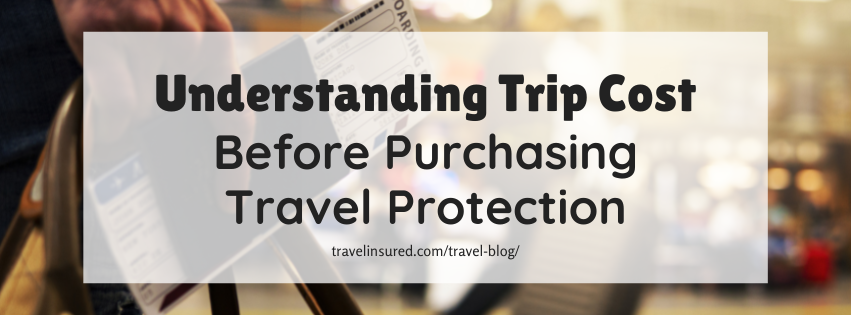by
Haley Dobrowski
| Feb 14, 2023

In order to get a quote and purchase travel protection for your upcoming trip, you will be asked to provide your destination, the country and state you reside in, your travel dates, the date of your initial trip payment for time sensitive benefit eligibility, your age, and finally your trip cost. Although we provide a calculator to help you add up all your trip costs during the quoting process, it is important to understand exactly which expenses should be included and which expenses should be omitted.. To help you along the way, we have provided answers to some frequently asked questions about trip costs.
What does Trip Cost mean?
Before figuring out which of your travel expenses can be included in your insurable trip cost, it can be helpful to first understand what trip cost means. Your trip cost is all the pre-paid and non-refundable costs for travel arrangements. Now you might be asking yourself - what makes up pre-paid and non-refundable costs for travel arrangements? We’ll break it down for you. Pre-paid trip costs are the costs for travel arrangements that you have paid before you leave for your trip, such as deposits and fees. Non-refundable costs are the pre-paid trip costs for travel arrangements you wouldn’t get back if you were to cancel. If an expense for a travel arrangement can be refunded if you cancel your trip, meaning that you can get your money back, then it should not be included in your trip cost.
What types of trip expenses can be included in your trip cost?
Now that we know your trip cost is all your pre-paid and non-refundable expenses for travel arrangements that you would normally lose if you had to cancel your trip, let’s dig more into what types of trip expenses can be included. Trip costs need to be for “travel arrangements” in order to be insurable. Travel arrangements are defined in your plan, with most plans defining “travel arrangements” as expenses for (a) transportation; (b) accommodations; and (c) other specified services arranged for your trip by your travel supplier. Some common trip expenses that may qualify as insurable travel arrangements include pre-paid and non-refundable expenses for airline tickets, checking your bags, cruises and excursions, tours, rental cars, drink packages, ski lift tickets, and even hotels and Airbnb’s.
What types of trip expenses cannot be included in your trip cost?
When calculating your trip cost, you want to ensure that all expenses that you would lose if you had to cancel your trip before departure are covered. Expenses such as, your passport, meals, tours purchased at your destination, and frequent flyer miles/reward points should not be included in your trip cost because these are not pre-paid and non-refundable costs for travel arrangements. However, the government taxes and fees associated with frequent flyer miles can be included when calculating your trip cost. Read our blog article for more information about coverage for miles and points.
Are trips costs calculated per person?
Yes - If you are purchasing a plan to cover more than one person, it is important to calculate the trip cost per person, according to what each person paid.
Can you add additional trip costs after purchase?
Short answer: Yes. You can add additional expenses to your trip cost after purchase as you get closer to your departure date. It’s important to note that these additions to your trip cost may result in a higher protection plan cost since the plan cost relies partially on trip cost. Although you can add additional trip costs after purchase, it is key to purchase a plan as soon as you make your first trip payment and book your flights and accommodations, so you can be eligible for time sensitive benefits.
Understanding and correctly calculating your insurable trip cost is important. To learn more about our travel protection plans or to get a quote, visit our website travelinsured.com or talk to your travel advisor.
AH-4970